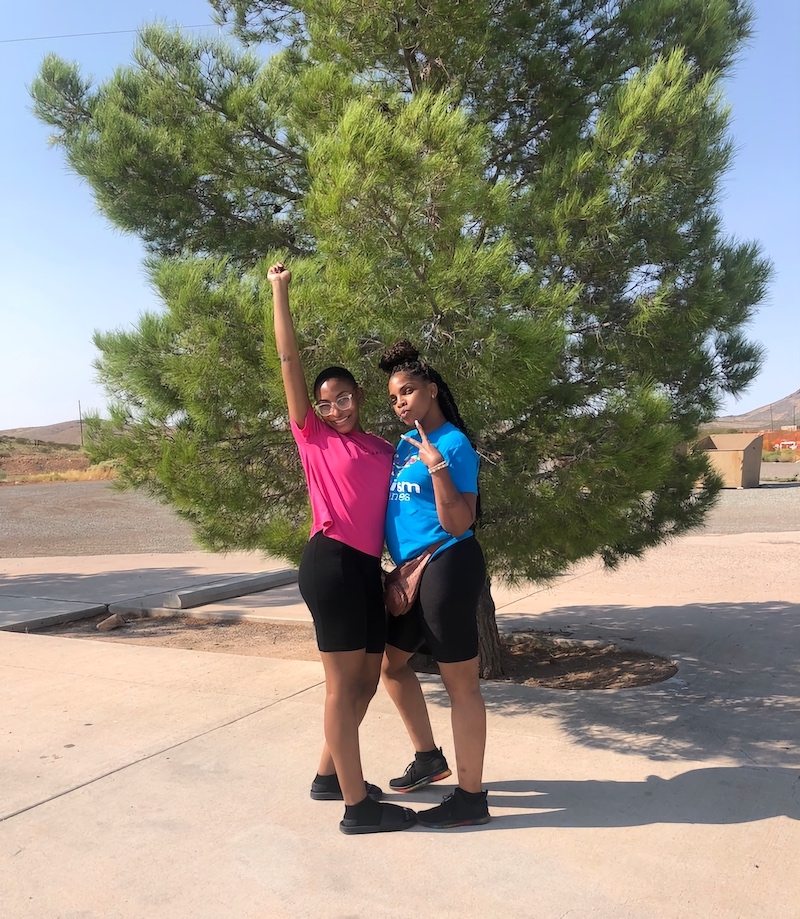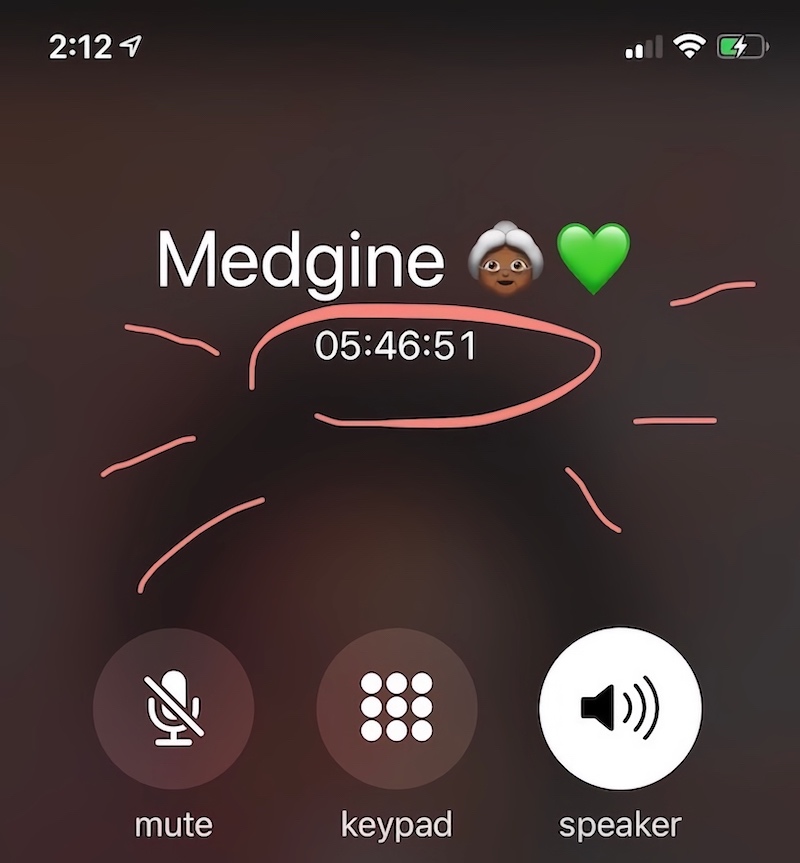Student Blog
Lamoni

Back in Business ⟩
August 24, 2020, by Lamoni
Today is the first day of classes for the fall semester and it honestly blows my mind! The week off between summer and fall FLEW by. I spent half of it driving to Los Angeles and the other half moving into my new place. It was a break from school but definitely still a busy week. Though the drive was not unbearable (and it was my second time), I do not plan on doing it again. From New Orleans to Los Angeles is nearly 30 hours and 2,000 miles long. Luckily, my mom decided to drive with me and split the load. I am so happy that she did! Though I was home since March, my mom and I had not spent much time together. I was always in my room tending to some sort of work. So, this road trip to school was some much-needed mother-daughter time before officially being in another state for several months. We spent the hours jamming to throwback 90s R&B and chatting about old memories.


My mom stayed for a few days to help me get some apartment things that I needed then flew back home. I got some rest on Friday and Saturday then it was time to prep for school on Sunday. I added all of my classes, work times, and lab meetings to my calendar. My trusted planner is back to being glued to my hip. My sticky notes are fully stocked. I still do not have a desk but hopefully that will change in the next week. *fingers crossed* Time to get back to business! I am feeling a bit stressed and nervous but I did this before which means I am capable of doing it again.
SO . . . how am I preparing for another fast-paced and intensive semester from home?
Last semester, I found a few things that helped reduce stress and made me feel a bit more balanced. They are all easy and I hope that they can help you too.
- Exercise
The biggest challenge is starting. But, once you are in it, it feels great. Not only does it feel like stress is being released with your sweat, it also adds to your list of accomplishments for the day. Even if you are unable to do anything else, at least you can say that you got in a good workout. It feels awesome to check something off of the list and it motivates you to do more. Exercise does not always have to be exhausting—it can actually be very energizing. I like to work out at the start of my day. Knowing that the remainder of the day will be spent sitting in class, exercising in the morning helps me get into a positive headspace. - Go outdoors
Use any opportunity that you can to go outdoors and get fresh air. This one is pretty simple. Smell the flowers, hear the birds chirping, feel the sun on your skin. This is necessary. Your cozy home cannot provide what nature gives you. Even if it is as simple as going out to get the mail or walking to your car, take a few extra moments to enjoy being outside. - Hang out with your friends
*in a socially distanced way! Zoom calls and facetime is cool and it works if it is your only form of communication. But after being online ALL day, it can sometimes feel like an extra chore. If you can go to a park and spread out, do that! It is nice to see your friends’ faces in person. It’s also a change of scenery which is just as necessary and meaningful for your mental health.
I know that we all hoped things would look better by now and the fact that it is not can really dampen the mood. However, taking note of the little things that make you happy or make you feel even a little better is very important. Now is the time to find joy in the small things.
⋯

Student-Work-Life Balance ⟩
July 30, 2020, by Lamoni
Classes Getting Involved Life Hacks
We often hear about the importance of a work-life balance or a student-life and social-life balance. However, we do not talk much about the balance of being a student, being an employee, and being social or engaging in self-care. When I discuss work, I do not mean students that have student jobs (like me). Though that is also something to consider. Being a student with a student job still requires balancing but student jobs understand that your life as a student comes first. These jobs often allow time for studying while at work. They also tend to be more flexible to a student’s schedule. My boss constantly emphasizes self-care and she consistently remind my coworkers and I to adjust our schedules as needed. Shout-out to her; we love you Kim. The flexibility that I see in my job as a student worker typically does not ring true for employment outside of the university. Most employers expect their employees to be committed to a certain schedule and to give their full attention to their work while they are on the clock.
Recently, a few first-year students told me that they would like to become more involved but feel too busy with summer courses at the moment. Some even asked for advice on what they should do because they assumed that their lack of involvement would reflect poorly on them. I want to assure everyone that you are not obligated to join any organizations. Please do not overwhelm yourselves. In fact, many people do not become involved until their spring semester. The goal of the student-organization fair and any emails that you are receiving from organizations are to make you aware of what is out there. Think of them as saying “here are your options, if you so choose” and not “pick me!” If your plate is full or you simply are not interested right now, that is completely fine.
I brought up these concerns with my friend, Daphne, and they spoke about their own experience during their first semester of the master’s program (which we all know is very fast paced). But more than student life which includes student organizations and groups, they told me about how difficult it was to also have a job. After being in class from 8:30AM to 4:30PM, Daphne would go to work. Then after work, they would tend to homework and studying. They said “during summer, it was easy to be overwhelmed with everything going on. There were so many extracurriculars that I was I was interested in, but I did not have time between class and work. I hardly had time for sleep.” Daphne also mentioned feeling alone and unaware of any other students balancing jobs on top of their studies.
Now, with campus being closed due to COVID-19 and many student jobs being unavailable, I believe some students have picked up work outside of school. Additionally, I know that some students have children or are responsible for financially contributing to their household – maybe more so because of the pandemic. I have heard from some of my peers that their families are requiring more financial assistance from them. It is difficult to balance student-life, work-life, and life-life. Add in COVID-19 and it can become an even greater struggle.
So, what do you do?
If you can say “no,” say it.
I know that some responsibilities are non-negotiable. However, not everything requires your time. When someone asks something of you, the answer “no” is a viable option. For the people that have a hard time saying no, there are several ways to say it ~nicely~
Special shoutout to @BRIARAMs on twitter for creating a thread. Here are some of her suggestions.
“I appreciate you for considering me, but this is not for me at the moment.”
“I am unsure, may we revisit this another time?”
“Thank you so much for thinking of me, but I have committed to something else.”
“Unfortunately, now is not a good time.”
I used to have difficulty telling people no but there are only so many hours in a day. Plus, I cannot get the job done effectively If I am tired or have to tend to 100 things at once. Learning how to say no to some things allows you to say yes to what is important to you.
Reduce your involvement
Sometimes we get excited and push ourselves to become more involved than necessary. Similar to saying no, reducing your involvement helps to take some things off of your plate. As mentioned, many of you want to become more involved but you are concerned about the commitment. If there is something that you absolutely want to be a part of, become a member. But remember—That does not mean you have to be a board member. You do not have to show up to every meeting. You do not have to take on additional roles. Do what you can and nothing more.
When assistance is offered, take it
During these uncertain times, there are programs, loans, and grants to alleviate stress (e.g., CARES Act Federal Grant, housing/rent assistance, business loans). Take advantage of those modes of assistance. Their sole purpose is to offer help so do not feel bad. Apply for what you need. If you need them all, apply for them all.
Ask for help
When help is offered, we are more likely to take it than to directly ask for it. A lot of people struggle with asking for help. But honestly, there is no harm in it. The worst thing that can happen is being told no. Do you foresee yourself needing an extension on your paper? Ask for it. Ask your boss if you can do readings at work when things are moving slow. Many people are more understanding than we think. If you explain your situation, they may be willing to help you out.
I wish life was as simple as saying – just be a student and fully commit to that. But in reality, there are bills, there are student loans, there are car payments. There are responsibilities outside of being a student. However, there are a few things that you can do to make it all feel a bit more manageable. I hope these tips offer some relief.
⋯

A 30 Minute Phone Call Became 6 Hours ⟩
July 17, 2020, by Lamoni
Due to my super tight schedule of balancing five classes, a job, research, and sleep (because sleep is my best friend and I am adamant about making time for it!), I do not call my friends as often as I would like. In the past, spontaneous phone calls were an easy and quick way to check in. Now? I pretty much rely on everything being planned on a To-Do list. Once upon a time, spontaneity was fun and refreshing. But now it throws me off schedule and leads to feelings of chaos. None of that, please!
My close friend from college and I have a semi-regular schedule for when we talk. We try to check in every two weeks around the same time (8:30 CST for me, 9:30 EST for her). However, I had to stay up late to finish an assignment on one of our scheduled nights and asked my friend if we could chat another time. Then the next week rolled by in what felt like a flash. The following week, I had one day in my schedule that was pretty open. I thought “Great, I can call my friend!” Too bad that when I reached out, she said that that day did not work for her. Another week went by. I was out of our routine and sort of stopped looking for time to chat. Finally, after 5 weeks, we both had an empty slot on the same day. I actually wrote her name in my planner with a “30m” next to it, which meant that I allotted thirty minutes to the call. I intended to complete several tasks once off the phone. I always looked forward to our biweekly check-ins but because I had not done it in a while, I was still in the mode of work work work. I viewed the call as an assignment that needed to get done efficiently.
When I answered the phone, I was greeted with “Hey, MONI!” It was one of those greetings where you could hear the smile on someone’s face. Her voice was lifted, warm, and welcoming. It was like a hug through the screen. Her positive energy transferred to me and I instantly felt at ease. The built-up stress had calmed down. The constant thoughts about the tasks I needed to complete had gone quiet. We talked about TV shows, future vacations that we want to take together, our families, what we ate, old college memories, relationships, jokes we heard throughout the weeks, and even outrageous what-would-you-do scenarios. Less than five minutes were spent talking about work or school. That was where all of our time went throughout the week. This was our time to focus on something else. Thirty minutes came and went. Then it was two hours. By the time we chose to end the call, it was 2AM and nearly six hours had passed! You know how the saying goes—“time flies when you’re having fun!” That could not have been more true. Even after all of those hours, I did not want the call to end. If my body had not needed sleep (my other best friend), we probably could have spent an additional six hours together. I woke up the next morning feeling restored.

Proof of my nearly 6 hour long phone call that ended at 2AM
I am someone that loves solitude. My time alone is very special to me. I am also naturally more introverted. All that is to say that I am very comfortable with being by myself. But pair that with a heavy workload and I can close myself off for too long. So long that I forget the beauty of friendship. Spending time with or talking to someone that loves you is like a natural healer - a remedy for stress. (Side note: shout out to OT534 and the professors, Kelcie Kadowaki and Laura Marie Cox, who work for the Faculty Practice because I learned that this is a fact. As part of our stress response, the parasympathetic nervous system aka “Tend and Befriend” releases oxytocin which then urges us to engage in positive social interactions. This leads to stress reduction). Being with people that care about you increases your health and wellness!
Next time you want to cancel plans with your friends or family because of a high workload or increased stress, don’t. They are your stress remedy. I bet that after spending time with the people that you love, you will feel refreshed and better prepared to finish your work. Health comes first, always. Everything else comes later.
Sometimes you do not realize what you need until you get it. But once you have that realization, get more of it. Get it not only when it is desperately needed but also as a preventative measure. Stay safe and stay healthy ✌️
⋯

Defeating the Feelings of Inadequacy and Non-belonging ⟩
July 2, 2020, by Lamoni
Yesterday, I presented at the student organization fair to give students some information about COTAD. When we, the presenters, were introduced, Dr. Rafeedie referred to us as “second year students.” I am still shocked every time that I hear that phrase. It has already been a full year of graduate school. Am I really half-way done? This question made me think about how I got to this point and all of the feelings of inadequacy that I had to tackle along the way.
The doubts started when I first began my pursuit of higher education. Before my first day of college, I was eager to attend a highly ranked school. I wanted to be challenged. But when I arrived, I was challenged in more ways than one. No one there looked like me. The number of Black students was roughly 5%. And of those Black students, even less were African American. And of those African Americans, few came from low socioeconomic backgrounds. Naturally, I felt out of place due to my race, ethnicity, and income. Along with sharing a class with people from some of the best private high schools in America, I recall questioning my belonging at least several times a week. I do not remember telling anyone about these feelings. My best friend in college was Black but she was not African American and her education was completely paid for by her family. My college was private and very expensive by the way. So, I did not think she would understand. I thought about calling my best friend from high school but she decided not to attend college and was starting a family. She would not understand either. Instead, I pushed those thoughts deep down inside and trucked along. When I graduated, it was the biggest accomplishment of my life. I was so proud! My family was proud! My community was proud!
After college, I knew that I wanted to become an occupational therapist. That, of course, meant going to graduate school. Like I did for college, I traveled across the nation to attend graduate school. I had no family or friends with me. I was starting anew. However, I had already done this once. It would be easier this time. Not so much. Very quickly, the feelings of inadequacy came back. As I walked down the hallways of Chan, I saw portraits of influential women in occupational therapy. Not one portrait was of a Black woman. When we entered the large G37 lecture room, I continued my search for other people that looked like me. I found two. As a class of 144 people, this meant that Black students made up 2%. Truthfully, it was not surprising. Though half of African Americans attend college, according to the National Black Occupational Therapy Caucus, only half of that percentage graduates. According to AOTA’s workforce data from 2014, the percentage of Black occupational therapists is only 4%. With these statistics, it began to feel like this was not the right place for me. But there was a turning point.
During our first summer of the program, we had the honor of receiving a lecture from Dr. Lela Llorens. At our lecture, she spoke about her challenges as a Black occupational therapist and her own feelings of non-belonging. Without knowing, she validated my emotions. Despite her feelings of estrangement, Dr. Llorens greatly influenced our profession’s body of knowledge. In 1969, she received the Eleanor Clarke Slagle Lectureship award — one of the greatest recognitions an occupational therapist can obtain. Additionally, in celebration of occupational therapy’s 100 year history, Dr. Llorens was recognized in AOTA’s list of 100 influential People. Hearing about her achievements dismantled all of my negative thoughts. I have come this far, and I will keep going. Maybe this place was not originally designed for me but there is space for me now. There is space here for others like me, too.
Here are my suggestions for when you feel like you are inadequate or do not belong:
You have jumped over hurdles and navigated barriers time and time again. That is no easy feat! Whether you are just now entering college, finishing college, starting your masters, or completing your OTD, your accomplishments thus far show that you are capable.
When there is already a feeling of non-belonging, it is easy to focus on the negatives. It can send you into a spiral of emphasizing your “failures.” Instead, view everything as a learning tool. If it did not work in the past, what can you do differently? And if it did work, celebrate! Reward yourself! Break the cycle of dismissing validation.
Create a detailed image that affirms your desired outcomes. See the bigger picture. When we have a concrete idea of what we are working toward, we stay motivated. Small rocks in our path may make us stumble but never fall. Do not lose sight of the ultimate goal.
Just like I belong here, so do you.
⋯

How to be an Ally ⟩
June 12, 2020, by Lamoni
With the world’s recent affairs, there’s been a lot of discussion about police brutality, the Black Lives Matter movement, misuse of power, the meaning behind certain symbols such as the confederate flag, etc. With these discussions circulating, I have seen a number of well-intentioned acts of solidarity. I have also seen acts that are inappropriate.
In our profession, it is important to build trust with our team and our clients. An important way to build trust is by consistently showing that we are allies, people that care about the same cause and act toward the same goal. It sounds rather simple, but it requires a lot of effort. Right now, your Black friends, classmates, faculty, and staff need to see that effort. And we need it to be vigorous and constant. That being said, I have decided to lay out some points about what it means to be an ally.
What is allyship?
1. Listening more and speaking less
What you’ve learned through books, articles, and observation does not and will not equate to the lived experience. Therefore, it is absolutely necessary to spend most of your time listening rather than speaking. There is always room to learn more.
2. Acknowledging your privilege
You cannot call for equality without first acknowledging that there is an imbalance. Recognize that you have certain advantages that others do not. Use that advantage to amplify the voices of those unheard.
3. Accepting criticism
People tend to immediately begin defending themselves when they are criticized. That can lead to a missed opportunity. Criticism is a form of feedback that should be used to reflect and grow. Embrace it.
What allyship is not
Allyship is not rooted in performance. Lately, it seems that calling oneself an ally is very on-trend. However, as stated, allyship is a lifelong process. It requires consistency in reflection, learning, and action. Expecting awards and recognition suggests that you are conveniently presenting as an ally or have an ulterior motive. Next time you create a #BLM post, ask yourself, “am I doing this for an applause?” and, “if people ask about this post, will I be able to say that I’ve put action behind my words?” (e.g. marched in protests, signed petitions, called legislators).
Being an ally is hard work. Confronting your implicit biases, speaking up when a family member says something ignorant, and recognizing the ways that you participate in oppressive systems is difficult. However, it is necessary. If you do not feel uncomfortable or challenged, you are not actively doing your part.
We have a beautiful profession where we get to advocate for others. Let’s all start now.
⋯





